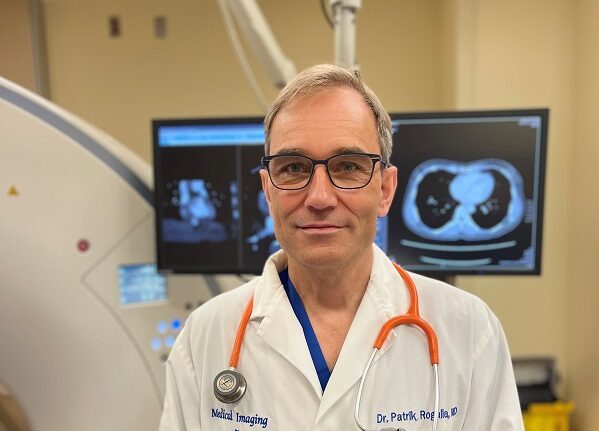
Patients who require diagnostic testing for unknown entities, such as growths, in and around the heart can now opt for a minimally invasive outpatient procedure, rather than open-heart surgery, thanks to innovation from UHN.
UHN’s Peter Munk Cardiac Centre is the only centre in Canada, and one of the few in the world, to offer this new outpatient testing procedure, which is dramatically reducing the hospital stay and recovery time for some patients.
Doctors depend on tumour biopsies to diagnose and determine appropriate treatment. Tissue samples from the heart are extremely difficult to retrieve and can have potentially life-threatening complications due to the continuous motion of the heart.
“There aren’t a lot of options for patients who need a cardiac or pericardial (the sac that surrounds the heart) biopsy,” explains Dr. Patrik Rogalla, Division Head, Cardiovascular and Thoracic Imaging, Joint Department of Medical Imaging, UHN.
“Up until recently, the only option for these patients was open-heart surgery. Whether the entity is malignant or benign, you’re putting the patient through a very invasive procedure (an operation), simply to determine their diagnosis.”
Dr. Robert Cusimano, a cardiac surgeon and cardiac tumour specialist at Peter Munk Cardiac Centre, sees some of the most complex cardiac cases in the country. Patients who are found to have cardiac or pericardial tumours are likely referred to Dr. Cusimano.
To better serve these patients, Dr. Rogalla and his team developed a new procedure to biopsy masses in and around the heart.
‘It spares the patient from surgery, which has obvious benefits’
The procedure involves manually synchronizing a computerized tomography (CT) scan and fluoroscopy with the electrocardiogram (ECG) to safely collect the sample. The synchronization device was supported by UHN biomedical engineer Ali Ursani.
The average cost of undergoing surgery to biopsy the heart is approximately $6,725. Recovery time is variable, depending on the location of the abnormal tissues and the magnitude of the operation required to collect a sample.
The average hospital stay for this type of procedure is seven days, including a day-and-a-half in the intensive care unit.
By contrast, this new testing procedure takes an average of 32 minutes. Patients typically leave the hospital following a two-hour recovery in the medical imaging day unit.
“The benefits of this form of minimally invasive cardiac or pericardial biopsy are significant,” says Dr. Cusimano. “It spares the patient from surgery, which has obvious benefits.
“So if the mass is benign, the patient was spared an operation. If it’s not, treatments can be coordinated and planned without having to wait for healing to occur, saving time that may be important both for undergoing treatments sooner and for making any subsequent treatments or operations potentially safer.”
Earlier this year, Susan Bell was referred to Dr. Cusimano when doctors found a tumour on her heart. Susan was asymptomatic and had never undergone major surgery. Thanks to the pioneering efforts of Dr. Rogalla, Susan was able to avoid open-heart surgery for what turned out to be a benign tumour.
“It was very efficient,” says Susan. “It’s still hard to believe they took a sample from my heart.
“I don’t even remember the needle. There were no stitches, no scar – and I went home the same day. It’s a phenomenal procedure.”

